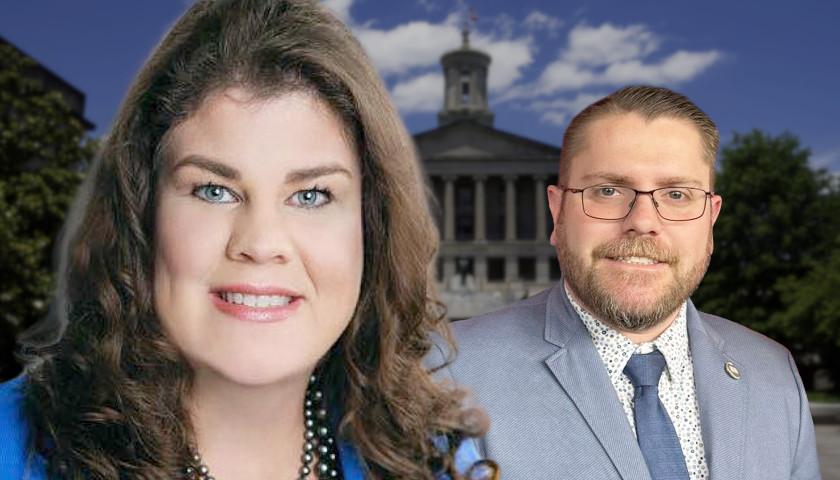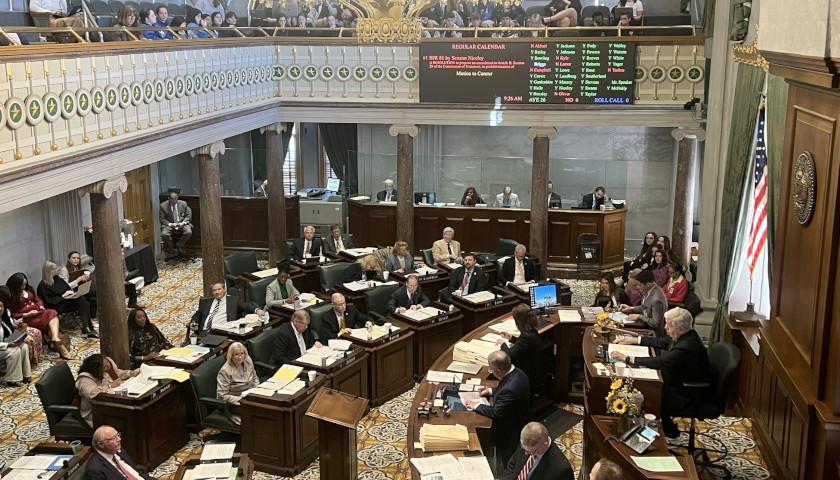Speaker of the Tennessee House Cameron Sexton (R-Crossville) caught some of his fellow lawmakers by surprise with last week’s announcement of his intent to introduce legislation that would stop the state from accepting federal K-12 education dollars.
As Senate Education Chair John Lundberg (R-Bristol) told The Tennessee Star, “The proposal wasn’t even on my radar, but now that the idea is out there, I’m intrigued by the prospect of peeling back the onion and taking a look at the many layers involved in accepting money for education from the federal government.”
House Democratic Caucus Chair John Ray Clemmons (D-Nashville) criticized the bill after it was introduced.
“It’s fiscal irresponsibility,” Clemmons told The Tennessean. “Tennessee taxpayers are taxed twice, federal and state taxes, but we’re not going to allow Tennesseans to benefit from their investment? We’re going to have to invest state dollars to fill in those funds when those funds could be better used to fully fund our schools, or investing in healthcare.”
On Thursday’s edition of The Tennessee Star Report with Michael Patrick Leahy, Sexton explained to Leahy that he doesn’t necessarily have a bill to file but that he does “think feasibly, you could do it next year.”
Sexton said, “The governor wisely did not spend all that $3.2 billion in recurring. He did some non-recurring. So that money will come back next year to us. So it’s not like we’re losing the recurring dollars.”
He added, “So we have the capability of talking about it this year, getting set up, spending all summer and all fall working towards something, if that’s what we want to do next year, which is what I would propose.”
Sexton is optimistic about success due to the widespread acceptance he’s received from the state’s leaders. He told Leahy that Governor Bill Lee, Lieutenant Governor Randy McNally (R-Oak Ridge), Commissioner of Education Penny Schwinn, and members of the Tennessee State House are “open” to his legislation.
A spokesman for McNally told the AP in regard to Sexton’s proposal, “McNally thinks a discussion about forgoing this money, a relatively small part of overall education funding, in order to maintain more control over how we educate our Tennessee students is a constructive conversation to have.”
Mark Pody (R-Lebanon), new to the Senate Education Committee, told The Star that he saw this as an opportunity to open a conversation with the federal government over control of resources. According to Pody, the state would acknowledge that the federal government has funds available, but request greater control over how those monies are utilized.
He argued that a similar conversation between LEAs and the Tennessee Department of Education (TDOE) is warranted as well. Pody said that sometimes the cost of managing the program outweighs the cost of taking the money.
Currently, Tennessee receives nearly $1.8 billion of the $8.3 billion it spends annually on public education from the federal government. But that money comes with certain caveats dictating how Tennessee should invest that money. Caveats that the Tennessee Department of Education (TNDOE) hasn’t always honored.
In spring 2021, a federal audit found a problem in the state’s calculations dating back to 2017, leading to a delay in securing final approval of Title I totals for the 2022-23 year. As a result, numbers were adjusted in December 2022, and local districts were left scrambling to adjust for the remainder of this school year.
Tennessee assessment policies were found to be out of compliance with federal law, and state officials were given until December 1, 2022, to submit evidence of corrections. While the TDOE failed to meet the deadline to provide evidence of correction, state and federal officials have said that fixes are ongoing. The need to make these adjustments would be rendered uncertain if Tennessee no longer accepted federal money.
While legislators may be on board for the conversation, education policy advocates are raising concerns.
Gini Pupo-Walker, the state director of the Education Trust in Tennessee, told the Nashville Scene, “I think it’s very concerning when you talk about … the state being on the hook for replacing nearly $2 billion in federal education funding, some of which is paid by our own taxpayers. “We may say that we have the money now to replace that money, but we might not in five years. … If you’re going to take them at face value, [that] they’re going to replace every one of those dollars, well, so be it. But will they be spent the same way? Can students and families expect that the design of those federal dollars — which is to say, to support students who are most vulnerable, often the most behind — will they be used in the same way? And will the rights of those students be honored and protected?”
Professional Educators of Tennessee (PET) Executive Director JC Bowman offered support to Sexton’s proposal while echoing some of Walker’s concerns.
“Speaker Sexton shares a view that many people in Tennessee share that Washington mandates are hurting, and not helping many Tennessee schools and students,” Bowman said in an email to The Star. “He has a point.”
However, he said, “Speaker Sexton made a point if the Federal Dollars were taken away: “The state will pick up the cost and still fund those things, but we will be free of the federal regulations. Federal money is seen as critical for low-income areas and special education. While Speaker Sexton made a point that if the Federal Dollars were taken away, the state would pick up the cost and still fund those things, unfortunately, many people, on both sides of the political aisle, do not have confidence in the Tennessee Department of Education to manage that task. The fear would be that we are just replacing federal oversight with state oversight.”
The move to decline federal funding is without precedent, but Sexton argued, “We need to really have a hard conversation about it, but first, we got to get everybody on the same page and say, you know what? This is what we want to do. We’re tired of the federal government telling us what to do. And I think we could be a leader. And I think what you’ll see is the red Republican states that are probably smaller in nature are able to do this quicker than the bigger ones.”
In talking with state legislators, House Education Committee Member Kevin Raper (R-Cleveland) sums up the general response from fellow Republican lawmakers when he told The Tennessee Star in an email, “I have not heard anything about this subject. I need to talk to Speaker Sexton to get more details before I could make an educated comment. I am confident, that if he made this statement, that he has a definitive plan to replace the federal funds.”
– – –
TC Weber is a reporter at The Tennessee Star and The Star News Network. He also writes the blog Dad Gone Wild. Follow TC on Twitter. Email tips to [email protected]. He’s the proud parent of two public school children and the spouse of a public school teacher.
Photo “Cameron Sexton” by Speaker Cameron Sexton. Background Photo “Classroom” by Liz. CC BY 2.0.









The Democrats only want to continue the total control of the Department of Education with its Socialist points that force our children to learn hate!
Get Tennessee off the federal education teat. If more state would do it would it be possible that the worthless Department of Education could actually be shut down? What a wonderful thought!
$2 billion? That’s 2 weeks of funding Zalensky in the Ukraine.
“It’s fiscal irresponsibility,” Clemmons told The Tennessean. “Tennessee taxpayers are taxed twice, federal and state taxes, but we’re not going to allow Tennesseans to benefit from their investment?
“Gini Pupo-Walker, the state director of the Education Trust in Tennessee, told the Nashville Scene, “I think it’s very concerning when you talk about … the state being on the hook for replacing nearly $2 billion in federal education funding, some of which is paid by our own taxpayers.”
Interesting the hand-wringers worried about giving up their Uncle Sugar money can’t seem to see it the same way when it comes to homeschoolers. According to Clemmons, they are taxed three times, since they fully fund their own education – and then enjoy the accusations of “stealing from the public schools”.
It was plain to see since the designed-to-fail, No Child Left Behind days that the only path to freedom for public schools is to cut the Uncle Sugar puppet strings. The federal financial incentives for more funding are all negative: economically disadvantaged, academically deficient, more Title 1, more reduced/free lunch, more special ed (including medicated kids). If the public system actually was the rising tide lifting all boats, they would work themselves out of Uncle Sugar money.
All the greedy little sticky fingers are trying to figure out how they can turn this into a financial windfall. Eliminate the entire Federal and State Department of Education. The money saved should be applied to the debt accumulated and any balance returned to the actual taxpayers. Not one thin dime of any of the money saved should be used by politicians or Academic administrators to grow their potion of an already bloated government.